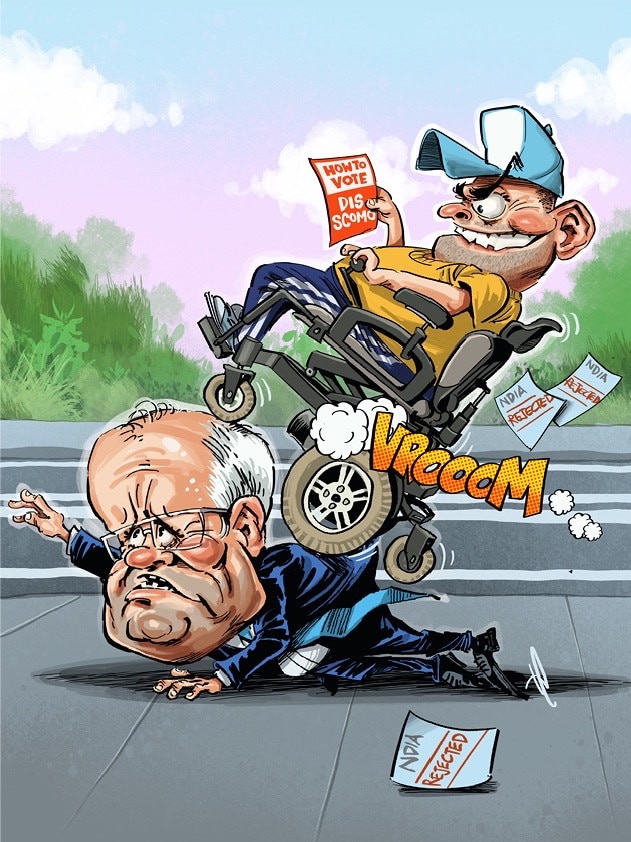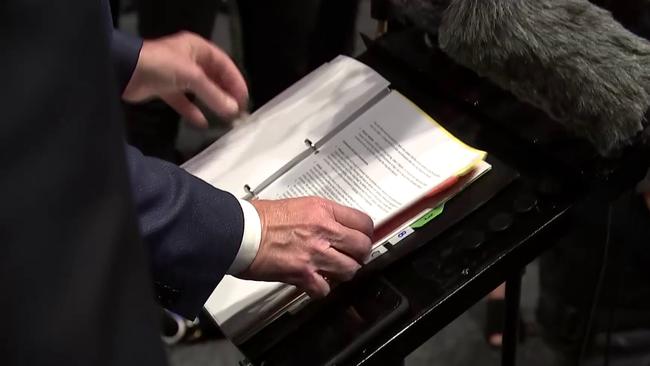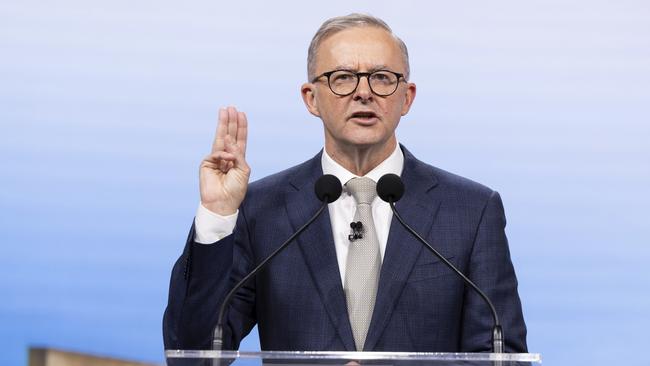Joe Hildebrand: NDIS ‘the new Work Choices’ as voters go to the polls
Amid all the noise of the election campaign there is one issue that could almost single-handedly determine the result — so much so it’s been dubbed “the new Work Choices”, writes Joe Hildebrand.
Opinion
Don't miss out on the headlines from Opinion. Followed categories will be added to My News.
Amid all the noise of the election campaign there is one sleeper issue that could almost single-handedly determine the result — so much so it’s been dubbed “the new Work Choices”.
And yet it has barely graced the radar of much political commentary or even the messaging of the leaders themselves until Anthony Albanese accidentally and spectacularly brought it to the fore.
This is, of course, the National Disability Insurance Scheme, Labor’s policy for which Albanese was infamously unable to articulate last week – struggling to outline his own six-point plan.
Labor strategists held their heads in their hands while Liberal strategists rubbed the latter with glee, and yet when Newspoll came out on Monday Albanese’s approval was up, Labor’s primary was up and its two-party preferred vote had risen to a landslide-level 54 per cent.
One is reminded of the apocryphal story of JFK apologising to the public after the Bay of Pigs disaster, only to watch his popularity skyrocket.

According to political legend, he turned to his advisers and said: “You’ve got to tell me to f--k up more often!”
Likewise, none of Albo’s stumbles have put a dent in Labor’s 2PP. It and other metrics are in fact widening at a stage in the campaign where conventional wisdom says they should be tightening.
Why? The issues that have dominated the campaign — the economy, cost of living, health and national security — have Labor and the Coalition fairly evenly matched. In many cases their policies are exactly the same.
But Labor-aligned researchers are picking up massive community concern over one area where the two parties are very different: the NDIS.
“I haven’t seen anything like it since Work Choices,” one pollster told The Daily Telegraph.
The issue came from nowhere to dominate the first Sky News People’s Forum when a woman revealed her four-year-old autistic son had his funding slashed by 30 per cent.

Albanese’s response was probably the strongest of the night while the PM quibbled about costs.
Albanese later won that debate on the basis he was warmer and more empathetic – but the NDIS retreated from public view as a first order issue.
Last week, however, thanks to Albanese’s gaffe it has shot back to the fore. Labor is once more reaping the benefits.
It is an immovable fact of politics that people will almost always vote with their hip pocket. Ideology is a luxury only the comfortable can afford.
And the NDIS goes straight to the hip pocket of those who desperately need it. Any moves to take that funding away – or even fear that a party might – and that party can kiss goodbye to close to 100 per cent of those voters. That’s 500,000 Australians – not to mention their families.

But what is less well known is the NDIS is also a massive job-creation scheme, employing more than 250,000 Australians. That’s an awful lot of voters whose livelihoods are on the line.
To put those numbers into sharp relief, the number of people either on or working for the NDIS in six key marginal Coalition seats is greater than the margin those seats are held by.
In the ultra-marginal Liberal seats of Bass (Tas), Chisholm (Vic) and Boothby (SA), the number of NDIS recipients alone is well above the margin.
If just a quarter of the 2424 recipients in Bass voted Liberal last time and change their vote this time, that alone would cost the Coalition the seat. Adding the number of people employed via the NDIS and the number of people reliant upon the scheme is also greater than the margin in Braddon (Tas), Swan (WA) and Longman (Qld).
That is six out of the seven most marginal Coalition seats Labor needs to win – all with the potential to fall on this issue alone.
Much of the credit for this goes to Albanese’s predecessor Bill Shorten. No doubt wanting to keep his erstwhile arch rival busy, Albanese gave Shorten the herculean task of making the NDIS both fair and sustainable.
Against all odds, Shorten produced a policy that will do just that.
Wrangling such a massively complex, expensive, sensitive and historic scheme takes brains and balls. Shorten showed he had plenty of both.
Despite the anxiety of advocates in the sector, he acknowledged there was waste, but he also worked hard to ensure Labor could be trusted to only target the genuine waste without cutting support that was needed.
As it happens, my best mate is on the NDIS. He is not only quadriplegic but also a business intelligence analyst who has worked in the disability services sector. I doubt there is anyone in the country who better understands how it needs to be reformed.
He nominated three key areas: making sure NDIS assessors have much better knowledge of disability requirements; eliminating the Kafkaesque bureaucratic process recipients need to go through; and making sure funding is not reduced if a recipient fails to spend all the funding they receive over a given period.
This last is vital because it means people will not waste funding on services they don’t need out of fear they will lose that level of funding and be unable to recoup it when they do need it.
I spoke to Shorten last week and he named these three exact areas as his priority. The funny thing was I hadn’t yet told him what my mate had said. That’s an 11 out of 10.
And so Anthony Albanese appears set for a thumping election win thanks to Bill Shorten.
What a long, strange trip it has been.





